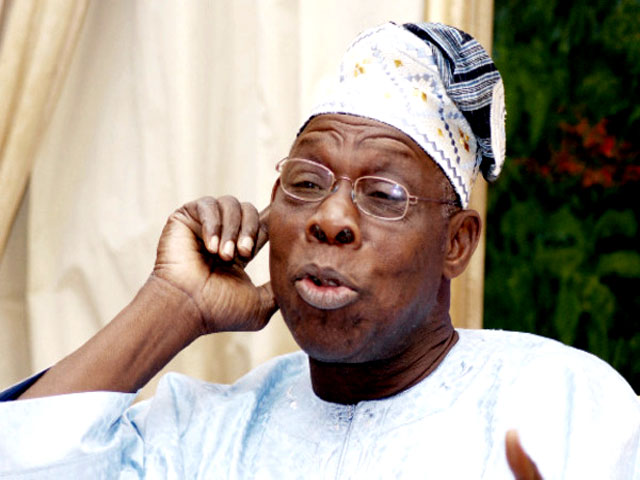Former President Olusegun Obasanjo has fingered corruption, insecurity and infrastructure decay as the major causes of underdevelopment on the African continent.
Obasanjo made this declaration at the inauguration of the newly-established Africa Institute at the Valparalso University in Indiana, USA.
According to the News Agency of Nigeria, NAN, the institute would serve as a cultural exchange between Africa generally and Nigeria specifically and the institute.
Obasanjo expressed concern that almost every African country had one form of security problem or the other, pointing out that insecurity would not allow development to thrive.
On the security challenges confronting Nigeria, the former president said government must properly identify remote causes of activities of the Boko Haram sect.
He stressed the need for more attention to be placed on improvement of infrastructure within the continent. He said human development should not be such that individuals were allowed to leave the continent and be servicing other lands.
He also called on Nigerians serving abroad to come back home and utilize their knowledge at home.
Obasanjo said, “We must develop people and retain them. We must encourage most of them that are in diaspora to move back home.”
Speaking on corruption, the former leader said that corruption was very serious and should not be undermined, adding that it was virtually in every aspect of life.
“If you pretend like there is no corruption, the world already knows there is corruption,” he said.
He also commended the efforts of some African leaders in carrying out reforms that had made the continent an emerging economy in the 21st century. He said that though Western economists had rules out Africa as a living continent about 10 years ago, some of the economists were now turning round to describe the 21st century as the best for Africa.
He explained that upon assumption of office in 1999, the country was indebted to the tune of $35bn and was spending about $3bn annually to service debts, a situation which forced him to seek debt relief.
He added, “I also decided that we would go for deep reforms. Our creditors took us very serious and granted us debt relief. The reserve of $3.7bn I met in 1999 grew to well over $45bn by the time I left office. After we paid over $12bn, we cleared the debts. Nigeria was not the only country moving in that direction.”
Obasanjo commended the university for honouring him, saying that the establishment of the institute was quite timely in view of global development.
Earlier, the President of the university, Dr Mark Heckler, said the exemplary leadership of Obasanjo in Africa and Nigeria was a driving force behind their choosing to honour him. Heckler said that the university was established in 1859 and the establishment of the Africa Institute was a dream come true.
Similarly, the Nigerian Ambassador to the USA, Prof Ade Adefuye also commended the University “for giving honour to whom honour is due”.
Meanwhile, the convener of the Save Nigeria Group (SNG) and Lagos pastor, Pastor Tunde Bakare, yesterday accused Obasanjo of allegedly returning the country to the path of corruption.
Pastor Bakare spoke at the first anniversary of the Occupy Nigeria protest in a message entitled “Corruption and the soul of Nigeria” at his Latter Rain Assembly church in Lagos.
He said that the former president should be held responsible for the alarming level of corruption in the country as he derailed Nigeria at a critical juncture of the nation’s life.
He said, “Nigerians wanted a better Nigeria. We wanted a chance to start all over again. We lost that chance when former president Olusegun Obasanjo assumed office in 1999. Today, the old man conveniently assumes the status of a statesman. He goes up and down telling everyone that Nigeria will go up in flames. That the man he planted in power has allowed corruption to go unchecked under his clueless watch. What he expediently forgets is his role in facilitating our arrival at the sticky junction we presently find ourselves in.”
He noted that Obasanjo was one person who derailed Nigeria at a critical juncture in her life as Nigerians were filled with enthusiasm in 1999 as they watched the military go back to the barracks.
“We were excited because it was the dawn of a new beginning. We wanted a different and better country, one with a defined national character and the possibility of creating a sense of self-pride we so badly need after all those traumatizing years under the military. It never happened.
“Obasanjo squandered that enthusiasm and returned the country to a path of corruption, prebendalism, primordial sentiments and even administrative bullying.”
The fiery televangelist, who said that corruption has been institutionalized in the country said, “I do not find it necessary to highlight in numerical details the countless corrupt practices that have found home in Nigeria, nor do I even want to attempt to capture their effects. They are all around us, clear as the sky.”
He said that from infrastructural deficits to social collapse to a lack of ambition to a collective sense of despondency to a lackadaisical attitude that make Nigerians look away from even the most outrageous acts of corruption, Nigerians were no longer strangers to the results of corruption even though it was doubtful they comprehended fully the impact it would have on the country for a long time to come.
Speaking on the first anniversary of the Occupy Nigeria protest, he stated the need for Nigerians not to be taken for granted by leaders in positions.
In his words, “The Occupy Nigeria protests revived the enthusiasm in Nigerians and showed us that when we are ready, we can always have our country back. For now, we appear to be more of a makeshift country simply existing without ideas, visions and goals.”

